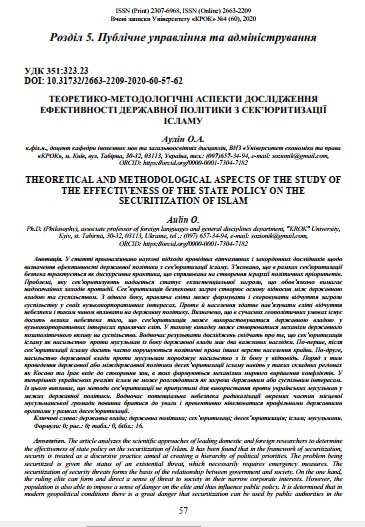THEORETICAL AND METHODOLOGICAL ASPECTS OF THE STUDY OF THE EFFECTIVENESS OF THE STATE POLICY ON THE SECURITIZATION OF ISLAM
DOI:
https://doi.org/10.31732/2663-2209-2020-60-57-62Keywords:
state power, state policy, securitization, desecuritization, іslam, muslimsAbstract
The article analyzes the scientific approaches of leading domestic and foreign researchers to determine the effectiveness of state policy on the securitization of Islam. It has been found that in the framework of securitization, security is treated as a discursive practice aimed at creating a hierarchy of political priorities. The problem being securitized is given the status of an existential threat, which necessarily requires emergency measures. The securitization of security threats forms the basis of the relationship between government and society. On the one hand, the ruling elite can form and direct a sense of threat to society in their narrow corporate interests. However, the population is also able to impose a sense of danger on the elite and thus influence public policy. It is determined that in modern geopolitical conditions there is a great danger that securitization can be used by public authorities in the narrow corporate interests of the ruling elites. In this case, a mechanism of state non-political influence on society can be created. At the same time, research suggests that the securitization of Islam as violence against Muslims by state authorities has two important consequences. First, after the securitization of Islam, the political rights of other sections of the population are often violated. Second, the government's violence against Muslims generates retaliatory violence. At the same time, pursuing a state or interstate policy of desecuritizing Islam, even in such complex regions as Kosovo and Iraq, leads to the creation of zones in which mechanisms for the peaceful settlement of conflicts are formed. In the current Ukrainian realities, Islam cannot be seen as a threat to state or public interests. It follows that securitization methods are not acceptable for use against Ukrainian Muslims in public policy. At the same time, the potential danger of radicalization of certain parts of the local Muslim community should be taken into account and preventively leveled by the relevant state bodies in the framework of desecuritization.
Downloads
References
Ole Waver “Security the Speech Act: Analysing the Politics of a Word”. URL: https://www.academia.edu/2237994/Security_the_Speech_Act _working_paper_1989.
Security: A New Framework for Analysis. By Barry Buzan, Ole Weaver, and Jaap de Wilde. Boulder, CO: Lynne Rienner, 1998. 239 p.
Шаленна Н. Концепція соціетальної безпеки у працях Баррі Бузана. Трансформація міжнародної безпеки: сучасні виклики та загрози : матеріали міжнародної наукової конференції (Львів, 22–23 березня 2018 р.). Львів: Факультет міжнародних відносин ЛНУ імені Івана Франка, 2018. С. 102-107.
Пахоменко С. П., Сараєва О. В. Взаємозв'язок ідентичності, пам'яті та безпеки як дослідницька парадигма (на прикладі Латвії). Науковий журнал «Політикус». 2020. № 2. С. 13-18.
Хельберг У. І. Сек’юритизація як політичний феномен. Магістеріум. Політичні студії. 2012. Вип. 46. С. 64-67.
Sécuritisation et construction d’un complexe de sécurité régional dans la Corne de l’Afrique. URL: https://www.erudit.org/fr/revues/ei/2018-v49-n1-ei03892/1050545ar.
Малиновська О.А. Міграційна політика: глобальний контекст та українські реалії : монографія. Київ : НІСД, 2018. 472 с.
Jocelyne Cesari.The Securitisation of Islam in Europe. URL: https://www.ceps.eu/ceps-publications/securitisation-islam-europe/.
Jonathan Fox, Yasemin Akbaba. Securitization of Islam and religious discrimination: Religious minorities in Western democracies, 1990–2008. URL: https://www.ceps.eu/ceps-publications/securitisation-islam-europe/
Zuhal Yesilyurt Gündüz. Europe and Islam: No Securitization, Please! URL: https://library.fes.de/pdf-files/id/04966.pdf.
Groß, Verena. Der Wandel der 'Weltbilder' deutscher Außenpolitik während des Kosovo- und Irak-Konfliktes im Kontext nationalstaatlicher und europäischer Reformen. URL: https://repositorium.ub.uni-osnabrueck.de.de/handle/urn:nbn:de:gbv:700-2014052212509.
Kathrin Lenz-Raymann. Securitization of Islam: A Vicious Circle: Counter-Terrorism and Freedom of Religion in Central Asia. URL: https://www.jstor.org/stable/j.ctv1fxgjp.
Рагозина Софья. Защищая "традиционный" ислам от "радикального": дискурс исламофобии в российских СМИ. URL : https://cyberleninka.ru/article/n/zaschischaya-traditsionnyy-islam-ot-radikalnogo-diskurs-islamofobii-v-rossiyskih-sm.
Аулін О. А. Сек’юритизація ісламу в державній політиці в Україні. Європейський вимір публічного управління: матеріали ІІІ регіональної наукової конференції; м. Чернігів, 20 грудня 2019. Чернігів : ЧНТУ, 2019. С. 109-113.
Пархоменко-Куцевіл О. Проблема сек'юритизації Ісламу у формуванні національної безпеки. Науковий вісник: Державне управління. 2020. №4(6). С.221-231.
Ярош О. А. Іслам у публічній сфері: теорії та суспільні практики. Київ: 2020. 76 с.



